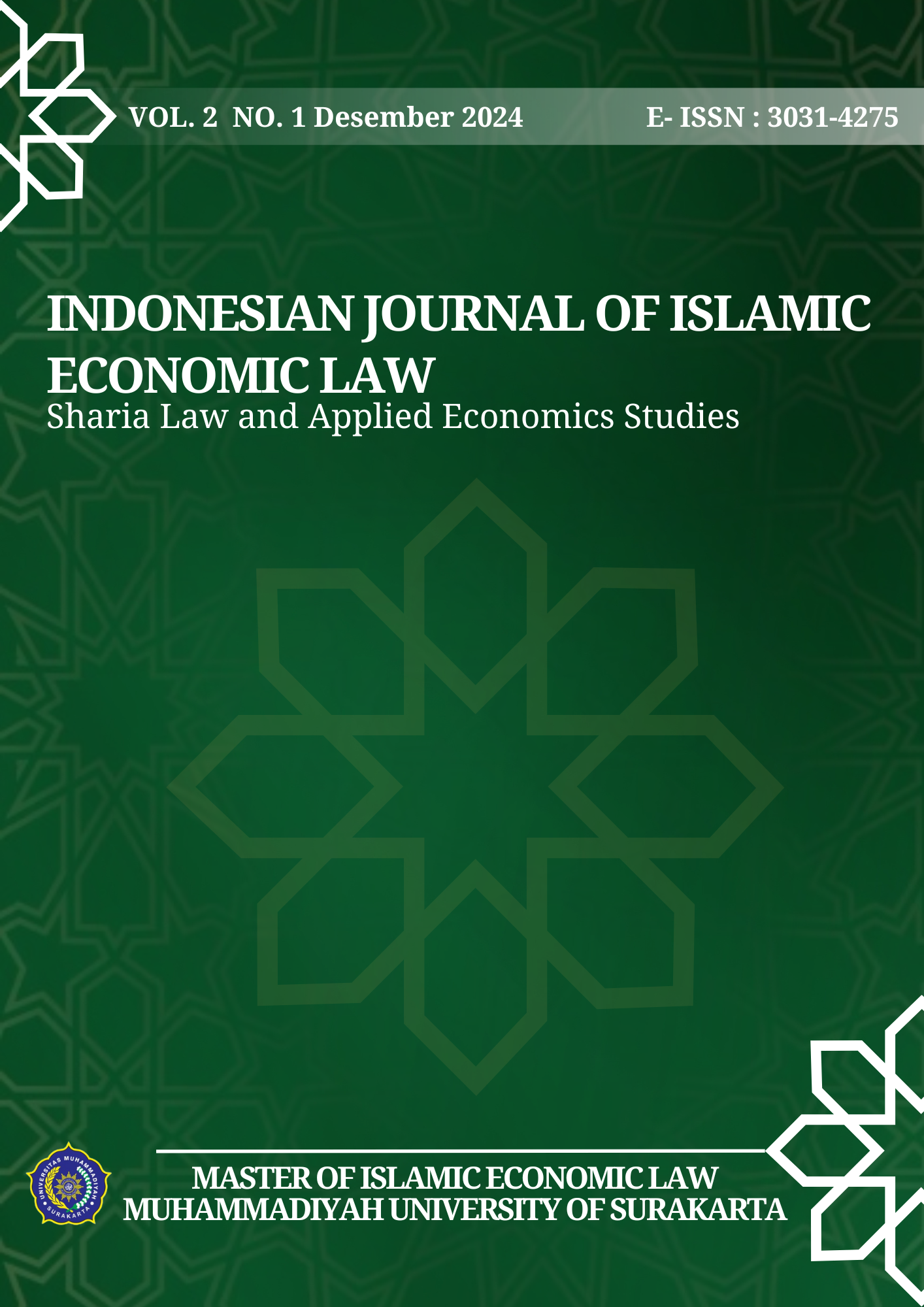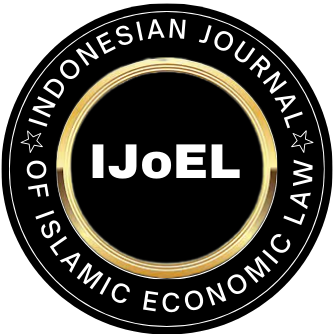Navigating Sharia Compliance in the Digital Age: An Examination of Bank Indonesia’s Hedging Swap Regulation (PBI 24/7/2022)
DOI:
https://doi.org/10.23917/ijoel.v2i1.5257Keywords:
Fiqh, Digital Finance Financial Technology, Banking Regulation, Financial productsAbstract
The present study aims to examine the alignment of Islamic values with the principles of efficiency and profitability, as contained in Bank Indonesia's Hedging Swap regulation, to ensure innovation in the digital financial sector. The objective of this study is to ascertain how the integration of contemporary banking law with fiqh can establish a framework that facilitates the development of Shariah compliant digital financial products that comply with financial law based on Islamic principles without compromising the capacity of banks to generate profits. This research adopted a qualitative methodology and a literature study approach, employing data processing techniques to collect and evaluate pertinent literature on digital financial products and Islamic jurisprudence. The data triangulation method was applied by sorting and extracting through a deductive approach to data interpretation specific to the research objectives. The study concluded that the al-tahawwuth al-murakkab contract successfully integrates Islamic principles, bank profits and the dynamics of the digital era. However, the approach is only relevant for commercial banks and does not fully support digital transformation in micro scale banks.
Downloads
References
Ahmad, Azlin Alisa, Mohd Hafiz Mohd Dasar, and Nik Abdul Rahim Nik Abdul Ghani. “Analysis of Tawarruq Contract in the Islamic Profit Rate Swap (IPRS) Implementation in Malaysia.” Qualitative Research in Financial Markets 14, no. 3 (May 19, 2022): 395–412. https://doi.org/10.1108/QRFM-01-2021-0007.
Andriyaningtyas, Irma, Muhammad Adam, and Sri Herianingrum. “Penerimaan E-Wallet Syariah Linkaja Dalam Rangka Pengembangan Ekonomi Digital Di Indonesia.” EKUITAS (Jurnal Ekonomi Dan Keuangan) 5, no. 4 (2022): 535–52. https://doi.org/10.24034/j25485024.y2021.v5.i4.4772.
Aziz, Abdul, Muhammad Yazid, and Rahmat Kurnia. Ekonomi Digital Dan Sistem Keuangan Islam. Edited by Zidny Nafi’ Hasbi. 1st ed. Yogyakarta: Jejak Pustaka, 2023.
Bank Indonesia. “Statistik Sistem Pembayaran Dan Infrastruktur Pasar Keuangan.” Bank Indonesia, 2023.
Bulut, Erkam Hasim. “Clearinghouses as Modern Tools to Ensure Compatibility with Islamic Principles.” Manchester Journal of Transnational Islamic Law 20, no. 1 (2024): 122–45. https://www.electronicpublications.org/stuff/1048.
Diener, Florian, and Miroslav Špaček. “Digital Transformation in Banking: A Managerial Perspective on Barriers to Change.” Sustainability 13, no. 4 (February 13, 2021): 2032. https://doi.org/10.3390/su13042032.
Dusuki, Asyraf Wajdi. “Shari’ah Parameters on the Islamic Foreign Exchange Swap as a Hedging Mechanism in Islamic Finance.” ISRA International Journal of Islamic Finance 1, no. 1 (December 1, 2009): 77–99. https://doi.org/10.55188/ijif.v1i1.66.
Hayat, Zeynelabidin. “عقود الصرف الآجلة وعقود مبادلة العملات (Forward - Swap) وبدائلها الشرعية.” Cumhuriyet İlahiyat Dergisi 25, no. 3 (December 15, 2021): 1381–99. https://doi.org/10.18505/cuid.886152.
Inayah, Nurul, and Andri Soemitra. “Fiqih Muamalah Uang Dan Lembaga Keuangan: Studi Literatur.” Jurnal Ilmiah Ekonomi Islam 8, no. 3 (2022): 2966–76. https://doi.org/10.29040/jiei.v8i3.6777.
Isman, I, and Ahmad Zainul Muttaqin. “Innovative Legal Modeling for Interdisciplinary Studies on Law and Economic Behavior.” Indonesian Journal of Islamic Economic Law 1, no. 1 (2023): 60–71. https://doi.org/10.23917/ijoel.v1i1.3437.
Narasati, Maulidah. “Financial Technology (Fintech) Di Indonesia Ditinjau Dari Perspektif Islam.” Indonesian Interdisciplinary Journal of Sharia Economics (IIJSE) 2, no. 2 (2020): 155–70.
Nugroho, Muh Rudi. “Tren Transaksi Digital Meningkat, Apa Dampaknya?” Universitas Islam Sunan Kalijaga, 2024.
Peraturan Bank Indonesia Nomor 24/7/PBI/2022 tentang Transaksi Swap Lindung Nilai Syariah kepada Bank Indonesia, Pub. L. No. Lembaran Negara Republik Indonesia Tahun 2022 Nomor 34/Bi (2022).
Razif, Nor Fahimah Mohd, Shamsiah Mohamad, and Noor Naemah Abdul Rahman. “Permissibility of Hedging in Islamic Finance.” Middle East Journal of Scientific Research 12, no. 2 (2012): 155–59. https://doi.org/10.5829/idosi.mejsr.2012.12.2.1679.
Risdayani, Risdayani, Muhammad Harsya Bachtiar, and Ahyarudin Ahyarudin. “Comparative Analysis of the Hiwalah Fatwa between Indonesia and Malaysia.” Indonesian Journal of Islamic Economic Law 1, no. 2 (June 30, 2024): 153–67. https://doi.org/10.23917/ijoel.v1i2.5507.
Tsakila, Nur Fazri, M. Arya Wirahadi, Azwar Alif Fadilah, and Henri Simanjuntak. “Analisis Dampak Fintech Terhadap Kinerja Dan Inovasi Perbankan Di Era Ekonomi Digital.” Indonesian Journal of Law and Justice 1, no. 4 (June 25, 2024): 11. https://doi.org/10.47134/ijlj.v1i4.2787.
Wadesango, N. “The Impact of Digital Banking Services on Performance of Commercial Banks.” Journal of Management Information and Decision Sciences 23, no. 23 (2020).
Zeya, Fahad, Nargis Sultana, Kazi Saifur Rahman, and Shakil Ahmad. “Digital Transformation Adoption in the Insurance Sector of Bangladesh: A Quantitative Study from the Perspective of Insurer.” In 2023 4th IEEE Global Conference for Advancement in Technology (GCAT), 1–5. IEEE, 2023. https://doi.org/10.1109/GCAT59970.2023.10353267.
Downloads
Submitted
Accepted
Published
How to Cite
Issue
Section
License
Copyright (c) 2025 Sinta Thia Anggraeni

This work is licensed under a Creative Commons Attribution 4.0 International License.










